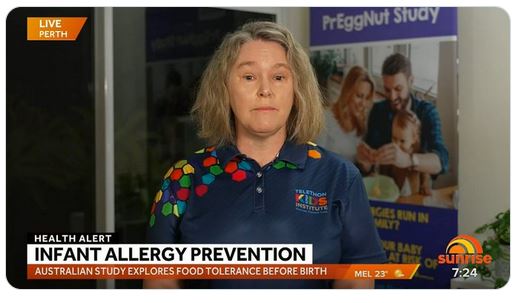By age one, 10% of babies will develop a food allergy, with egg and peanut the most common allergic foods.
It's been recently discovered that regular inclusion of egg and peanut in solid foods can reduce food allergies, however this is too late for some babies.
PrEggNut researchers are now trying to answer the question of whether the amount of eggs and peanuts a mother eats during pregnancy and breastfeeding has an influence on reducing the chances her baby will develop an egg or peanut food allergy.
The sub-project recruited women who were less than 23 weeks gestation, with families with two or more family members (mother, father, brother or sister of the new expected baby) who have had either eczema, asthma, hay fever and/or a food allergy.
Pregnant mothers were allocated to a diet containing different amounts of eggs and peanuts, with participants receive complementary peanuts and peanut butter, breastfeeding advice if needed, and dietary education on the introduction of solid foods to their baby.
For more information
Download the PrEggNut Study Participant Information Brochure (PDF)
Contact ORIGINSproject@telethonkids.org.au
Dr Debbie Palmer in the news
PrEggNut Chief Investigator, Dr Debbie Palmer, appeared on Channel 7's Sunrise program to discuss the changing advice for parents on food allergies. Dr Palmer discusses the changing approach, learned from initial findings from her work leading sub-projects PrEggNut & SYMBA, of introducing common allergen foods during pregancy or earlier in childhood to prevent the development of allergies. Watch the broadcast


